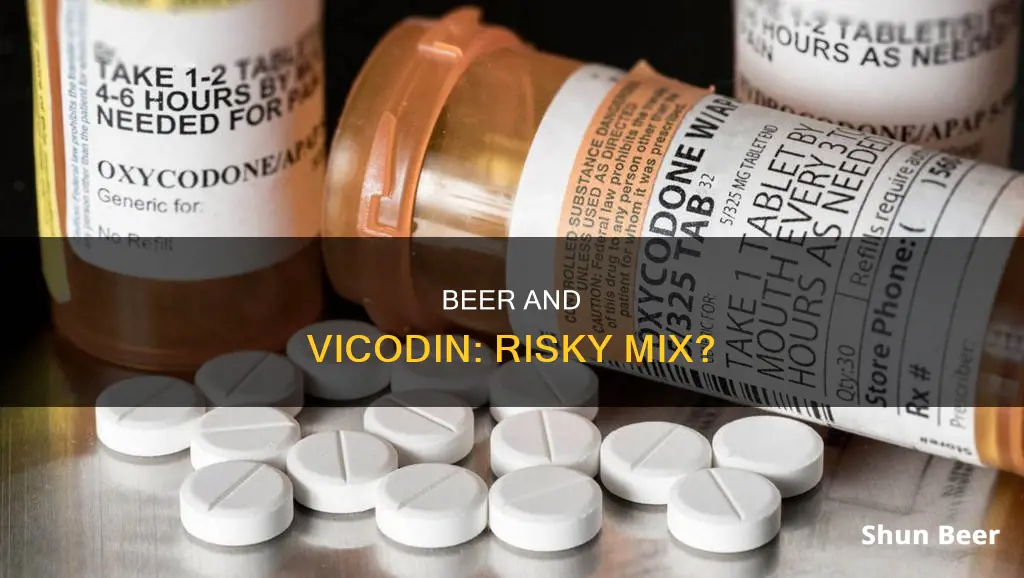
Combining beer and Vicodin can be extremely dangerous and even fatal. Both substances are central nervous system (CNS) depressants, which means they slow down the CNS, affecting your coordination, muscles, heart rate, and brain function. When mixed, the effects of both substances are amplified, leading to a high risk of respiratory depression, brain damage, coma, and even death. Additionally, the combination can cause severe liver damage and kidney problems. Beer and Vicodin should never be mixed due to the serious health risks involved.
| Characteristics | Values |
|---|---|
| Effect on the body | Both alcohol and Vicodin slow down the central nervous system, which is responsible for breathing. |
| Effect on the brain | Both alcohol and Vicodin are depressants that slow down brain function. |
| Effect on the heart | Combining alcohol and Vicodin can cause the heart to slow down too much or stop beating. |
| Effect on the kidneys | Taking the recommended dosage of acetaminophen (an ingredient in Vicodin) with moderate amounts of alcohol can increase the risk of kidney disease. |
| Effect on the liver | Both alcohol and opioids are processed in the liver, and prolonged use of both can cause severe liver damage. |
| Side effects | Shortness of breath, chest pain, stuffy nose, extreme sedation, confusion, sleepiness, uncontrolled eye movements, trouble remembering things, difficulty concentrating, nausea, vomiting, loss of appetite, sweating, abdominal pain, extreme tiredness, yellowing eyes/skin, dark urine, interrupted breathing during sleep, mental/mood changes, abdominal pain, difficulty urinating, loss of consciousness, etc. |
| Overdose | Combining alcohol and Vicodin can lead to an overdose, which may be fatal. |
What You'll Learn

The dangers of mixing beer and Vicodin
Mixing beer and Vicodin can be extremely dangerous and can have fatal consequences. Both substances are central nervous system (CNS) depressants, which slow down the brain and nervous system. When combined, their effects are amplified, and they can slow down the CNS to a dangerous degree. This can lead to respiratory depression, brain damage, coma, and even death.
Impact on the central nervous system
Beer is a depressant that slows down brain function, affecting coordination, muscles, and energy levels. Vicodin, a prescription opioid painkiller, also slows down the central nervous system. It binds to opioid receptors in the brain, altering the way pain signals interact with the brain. When taken together, beer and Vicodin can have a synergistic effect, enhancing each other's depressive effects on the CNS. This can lead to slowed breathing and heart rate, and in severe cases, respiratory failure and death.
Increased risk of overdose
The combination of beer and Vicodin can also impair judgment and decision-making, making it easier to accidentally overdose on Vicodin. Alcohol can enhance the muscle relaxant effects of Vicodin, which can be fatal as the heart may slow down too much or stop beating. Additionally, the relaxing effects of both substances can lead to loss of consciousness.
Liver and kidney damage
Long-term use of beer and Vicodin can cause severe liver and kidney damage. Both substances are processed in the liver, and their combined use can lead to acute liver failure. Additionally, acetaminophen, one of the components of Vicodin, has been linked to an increased risk of kidney disease when mixed with alcohol.
Addiction and tolerance
Both beer and Vicodin have a high risk for addiction and can be easily misused. Beer, being widely available and socially accepted, can be habit-forming. Vicodin, on the other hand, activates the reward center of the brain, creating feelings of pleasure and euphoria. This can lead to a dependence on the drug, with users needing higher doses to achieve the same effect. Mixing the two substances can enhance their addictive potential, making it difficult to stop consuming them.
The Magic Inside Beer Cartridges: How Do They Work?
You may want to see also

How beer and Vicodin affect the body
Beer and other alcoholic drinks are classified as depressants, slowing down the central nervous system and the brain. Alcohol interferes with the brain's communication pathways, affecting the way the brain looks and works, and changing mood and behaviour. It also impairs motor skills and cognitive abilities, making it harder to think clearly and move with coordination. This can lead to accidental injuries.
Beer also affects the heart, liver, pancreas, and immune system. Drinking a lot over a long time or too much on a single occasion can cause heart problems, including an irregular heartbeat, high blood pressure, and stretching and drooping of heart muscle. Alcohol causes the pancreas to produce toxic substances that can lead to dangerous inflammation, and drinking too much can weaken the immune system, making the body more susceptible to diseases like pneumonia and tuberculosis.
Beer is also associated with an increased risk of several types of cancer, including head and neck cancer, esophageal cancer, and breast cancer. Even one drink per day can increase a woman's risk of breast cancer by 5-15%.
Vicodin, on the other hand, is a prescription-strength painkiller that contains a combination of hydrocodone, an opioid pain reliever, and acetaminophen, a less potent non-opioid pain reliever. Opioids work in the brain to change how the body feels and responds to pain. Vicodin is designed to alter the way a person perceives pain by binding with opioid receptors in the brain. It slows down specific processes in the brain, resulting in feelings of relaxation and reduced awareness of surroundings.
Combining alcohol with Vicodin can have dangerous and potentially deadly effects. Both substances have antiseizure effects on the central nervous system, and when combined, their effects are amplified. This can lead to respiratory depression, brain damage, coma, and even death. The combination can also induce kidney damage and acute liver failure.
The effects of mixing Vicodin and alcohol include loss of consciousness, permanent nerve damage, and slowed heart and lung function, which can be fatal. Additionally, alcohol impairs judgment, increasing the risk of a Vicodin overdose.
Tanning with Beer: Does It Work?
You may want to see also

The addictive qualities of beer and Vicodin
Beer and Vicodin are both highly addictive substances. Beer is an alcoholic drink that stimulates the dopamine and endorphins in the brain. These are the brain's pleasure receptors, and once the brain recognises that drinking beer brings pleasure, it will seek to replicate that action. The brain will want to make you feel good, regardless of the deeper health problems it will cause.
Excessive beer drinking over a long period can diminish the number of neurotransmitters in the brain. Without these transmitters, you become more susceptible to feelings of depression or anxiety, which could then lead you to consume more beer to avoid these feelings. Beer also affects your decision-making abilities by slowing down how your brain processes information. This is why you see people getting into car accidents or fights they would otherwise have avoided.
Vicodin is a prescription-strength painkiller with a high risk of addiction. It is a synthetic opioid that activates the same neurotransmitters as opiate drugs such as heroin. It activates the same reward centre of your brain as drugs like cocaine or heroin, known as euphoriants. When Vicodin binds with opioid receptors in those areas of the brain, the feelings of stress change to pleasure and euphoria since you're no longer experiencing constant pain.
Vicodin is often prescribed to numb pain after surgery or a serious injury and is meant for short-term use. However, some people get addicted to the way it makes them feel. If you feel you need to take Vicodin every time you feel pain or that you can't feel pleasure without it, you may be dealing with a Vicodin addiction.
Mixing alcohol and Vicodin can be deadly. Both drugs have antiseizure effects on the central nervous system (CNS). When combined, their effects are amplified, which can induce respiratory depression, brain damage, coma, and death. They can also cause kidney damage and acute liver failure when used together.
Beer Left Outside: Still Refreshing or a Disaster?
You may want to see also

The short-term effects of mixing beer and Vicodin
Mixing beer and Vicodin can have a range of short-term effects on the body. Both substances are central nervous system (CNS) depressants, which means they slow down brain activity and cognitive functions such as attention and memory. They also slow down vital bodily functions, including respiration and heart rate.
When combined, the effects of these substances are amplified, and the risks associated with each are compounded. Beer and Vicodin can interact to cause the following short-term effects:
- Increased sedation and relaxation: Both substances have a sedative effect, which can be enhanced when they are mixed. This can lead to extreme drowsiness and sluggishness during the day.
- Respiratory depression: Beer and Vicodin can suppress respiration to dangerous levels, reducing the amount of oxygen in the body. This can cause shortness of breath, chest pain, or even respiratory failure.
- Cognitive impairments: Mixing beer and Vicodin can lead to issues with thinking, attention, judgment, and memory. This can increase the potential for engaging in impulsive or irrational behavior, such as risk-taking or unprotected sex.
- Suppressed heart rate: The combination of these substances can slow down the heart rate to a dangerous extent, increasing the risk of heart failure.
- Organ damage: The lack of oxygen caused by respiratory depression can lead to potential organ damage, including liver damage and kidney disease.
- Increased risk of overdose: Mixing beer and Vicodin enhances the effects of both, increasing the risk of overdosing on either or both substances.
- Enhanced euphoria: Beer and Vicodin can amplify each other's euphoric effects, which may be desirable to some but can also increase the potential for addiction or abuse of one or both substances.
- Uncontrolled eye movements: This is a common side effect of mixing beer and Vicodin and can be a visible sign of concurrent substance abuse.
It is important to note that mixing beer and Vicodin is extremely dangerous and can even be fatal. The enhanced effects of this combination can lead to respiratory failure, coma, and death. Therefore, it is strongly recommended to avoid consuming alcohol while taking Vicodin.
The Science Behind Beer Koozies: Do They Really Work?
You may want to see also

The long-term effects of mixing beer and Vicodin
Mixing beer and Vicodin can have several long-term effects on the body and mind. Both substances are central nervous system (CNS) depressants, which slow down brain activity and cognitive functions such as attention, memory, and rational or logical thinking processes. They also decrease heart rate and respiratory functions. When combined, these effects are amplified, and the risk of overdose increases.
- Respiratory issues: Mixing beer and Vicodin can lead to respiratory depression, with a significant risk of slowed breathing and even respiratory failure. This can result in a lack of oxygen to the body and brain, causing brain damage or even death.
- Organ damage: The combination of beer and Vicodin can cause severe damage to vital organs, including the liver, kidneys, heart, and lungs. Liver toxicity is a particular concern, as both substances are processed by the liver, and the risk of liver damage is significantly increased when they are used together.
- Cardiovascular problems: Mixing beer and Vicodin can lead to high blood pressure and other cardiovascular issues.
- Endocrine disruption: The combination of these substances can interfere with hormone regulation in the body.
- Increased risk of accidents and injury: The CNS depressant effects of beer and Vicodin impair coordination, motor skills, and judgment, increasing the risk of accidents and unintentional injuries.
- Psychological problems: Long-term use of beer and Vicodin can exacerbate existing psychological issues and increase the risk of developing mental health disorders such as depression and anxiety. It can also lead to issues with impulsivity, irrational behaviour, and risk-taking.
- Addiction: Both substances are highly addictive, and mixing them can increase the potential for developing a substance use disorder involving one or both drugs.
- Social and occupational issues: The long-term abuse of beer and Vicodin can negatively impact personal relationships, career, and educational pursuits. It can lead to social isolation, neglect of self-care, and failure to fulfil personal and professional obligations.
Shotgunning Beer: How to Chug Instantly
You may want to see also
Frequently asked questions
Vicodin is a prescription-strength painkiller that contains hydrocodone and acetaminophen. Hydrocodone is an opioid pain reliever, and acetaminophen is a non-opioid pain and fever reducer.
Mixing Vicodin and beer is dangerous and can be fatal. Both substances slow down the central nervous system and suppress respiration, which can lead to respiratory depression, brain damage, coma, and even death. The combination can also cause kidney damage and acute liver failure.
Common side effects include trouble remembering things, difficulty concentrating, uncontrolled eye movements, slow breathing, reduced heart rate, cold and clammy skin, drowsiness, confusion, and muscle spasms.
No, it is not safe to consume beer or any other alcoholic beverage while taking Vicodin. If you are prescribed Vicodin, you should avoid alcohol completely to prevent serious health risks.







